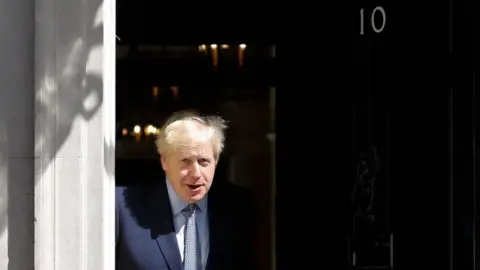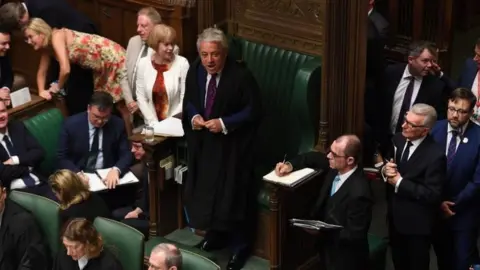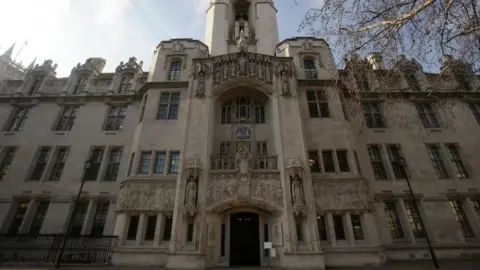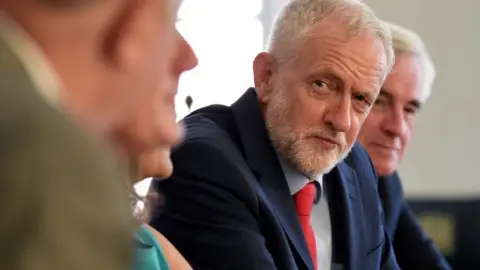Parliament suspension: Readers' questions answered
 Reuters
ReutersPrime Minister Boris Johnson's plan to suspend Parliament in September, before recommencing just 17 days before the scheduled Brexit date, has prompted many questions from our readers.
The idea of shutting down Parliament in this way - known as prorogation - has caused controversy in political circles, with critics saying it would stop MPs being able to play their democratic part in the Brexit process in the run-up to the planned exit date of 31 October.
We chose a sample of the questions we received from readers on this subject. Where we didn't know the answer, we enlisted the experts.
1. Could this lead to an early general election? - David Kuester
Suspending Parliament might well trigger an election, says the Institute for Government's Hannah White.
Ms White says it is probable the Speaker John Bercow - who has already called the government's plan "an offence against the democratic process" - will find an opportunity for the House of Commons to consider a motion of no confidence, even if the government does not provide time.
 Getty Images
Getty ImagesIf a majority of MPs vote against the government, a formal process kicks off under the Fixed-term Parliaments Act.
This provides a two-week period in which an alternative government could attempt to command a majority before a general election is triggered.
Ms White adds that any attempt to prorogue Parliament to pursue a no-deal policy is likely to prompt an election. "That may even be the intention," she says.
2. How long is the normal period of suspension before a Queen's Speech? - Anon
 PA Media
PA MediaIt's normal for new governments to shut down Parliament in order to hold a Queen's Speech.
The length of time varies - in 2016 Parliament was closed for four working days, while in 2014 it was closed for 13 days.
This year, if Parliament was suspended at the earliest proposed date of Monday, 9 September, it would be shut down for 25 working days before the new Queen's Speech on 14 October.
The Queen's Speech itself is a list of laws the government hopes to get approved by Parliament over the coming year. By convention, it is announced by the Sovereign in the presence of MPs, peers and other dignitaries in the House of Lords.
It also marks the start of the parliamentary year.
3. Could the Queen have said no? - David Stephens
 Reuters
ReutersIt would have been impossible for the Queen to turn down the prime minister's request, our royal correspondent Jonny Dymond writes.
The Queen acts on the advice of her prime minister.
While many, many people may be upset that Parliament is not going to sit at such time, precedent is on the side of those making this decision.
The idea is these things are settled in the Palace of Westminster, not Buckingham Palace.
BBC royal correspondent Nicholas Witchell adds: "It is most unlikely we will ever get any authoritative insight into what the Queen thought about the prime minister's request.
"In theory there are areas, known as the 'royal prerogative' where the monarch does have discretion, but in practice that discretion is a fantasy.
"The UK has a head of state who has always followed precedent and observed the rock-solid convention that as a constitutional monarch she is bound to follow the formal advice of her prime minister.
"To have rejected such advice would have taken us into even deeper constitutional waters, in which the monarch of the day might feel emboldened to follow his or her private instincts rather than the guidance of the duly-elected government of the day.
"So when the Privy Council met at Balmoral the Queen did the only thing she could do. But I believe we can say that these events will have caused significant unease within the palace. Their absolute priority has been to keep her away from the Brexit debate."
4. How many actual sitting days will be lost? What laws currently passing through Parliament will be killed off by the prorogation? - Tom
Parliament was expected to take a break or "recess" anyway from roughly 13 September - 8 October.
Official dates for recess are not actually confirmed, so it is hard to have a definitive number on how many actual sitting days will be lost. However, in theory, it will be between three and eight parliamentary days.
MPs have to approve recess dates unlike prorogations which they will not be consulted on.
On the laws currently passing through Parliament, the Institute for Government says that once Parliament is prorogued, most parliamentary business comes to an end and any unfinished business falls.
However, it is possible to carry over some government bills into the next session, the think tank says, with the agreement of representatives of the main parties.
There are currently 17 government bills in Parliament and the Institute for Government says many of these are eligible to be carried over.
But motions fall when Parliament is prorogued and no new bills or motions can be introduced.
5. Would a legal challenge succeed? - Carmel Dolan
It is not possible to mount a legal challenge to the Queen's exercise of her personal prerogative powers - these include the granting of honours, appointing the prime minister and proroguing parliament, our legal correspondent Clive Coleman says.
But it is possible to mount a legal challenge to the advice given to her by her prime minister.
That would be done by a judicial review of the advice - in other words asking a court to rule on whether the decision to advise the Queen to prorogue was lawful.
Those bringing it could argue that the prime minister has misunderstood and so failed to correctly apply the law relating to the power to prorogue.
They would most likely argue that the power exists purely for purposes that are consistent with the healthy functioning of the country's parliamentary democracy.
These purposes traditionally include enabling an election campaign to begin, and a Queen's speech to be prepared and delivered.
 PA Media
PA MediaIf it was successfully argued that the purpose of Mr Johnson's announcement was to frustrate the way the UK's parliamentary democracy operates, a court could rule that the power has been misused and so was unlawful.
There is already a legal challenge taking place in the Scottish courts, supported by a group of MPs and others who are seeking to expedite it.
If a challenge is brought in the English and Welsh courts, all of the challenges could end up in the UK Supreme Court.
In July, former Conservative Prime Minister Sir John Major threatened to use the courts to stop Parliament from being shut down.
He told BBC News: "The Queen's decision cannot be challenged in law but the prime minister's advice to the Queen can, I believe, be challenged in law - and I for one would be prepared to seek judicial review to prevent Parliament being bypassed."
While some believe a legal challenge could work, a source close to Boris Johnson told BBC News the threat of court action was "absurd".
6. Could this lead to another referendum on remaining or leaving? - Joyce
 Getty Images
Getty ImagesThe Institute for Government's Hannah White says she believes Wednesday's events have made the likelihood of a second referendum less likely.
She says: "It doesn't look like there's going to be time and a sufficient group of MPs backing that as an option before the likely Brexit date."
7. What about all the other non-Brexit business that Parliament needs to do? So much time has been spent on Brexit there must be a backlog. - Amandeep
Ms White says the time spent on Brexit is part of the justification Boris Johnson has made in his letter to MPs today about the need to restart the [parliamentary] session.
"But in practice it's not just about Brexit. It's about the fact that the government is in a minority in Parliament, it's been very hard to do anything significant on a legislative front, without risking defeats," she says.
"So yes there's a lot to do and the new session may help a bit, but even once Brexit is done, the government won't have a large majority, so it may be looking for an election to try and increase that majority and do more on the domestic front."
8. Can Jeremy Corbyn hold an alternative parliament if the Queen has suspended Parliament? - Luke
 Getty Images
Getty Images"Jeremy Corbyn can hold whatever meetings he likes," Ms White (of the Institute for Government) says.
"Any group of MPs can meet when Parliament isn't sitting, and can hold discussions and can choose to vote, but it won't have any constitutional significance.
"It doesn't actually do anything in legislative terms."
9. Is there any valid reason why the government couldn't have waited until after 31 October to suspend Parliament for a new session? - Chris Simon
Ms White says: "I think the answer to that is they don't want to.
"This is a political choice. Prorogation is a political choice and they've chosen the timing of this because they think it suits what they are trying to achieve."
10. Could the Speaker of the House thwart the intentions of the government? - Simon Pickhaver
Dr Catherine Haddon, a senior fellow at the Institute for Government, says the role of the Speaker - John Bercow - is to "promote and facilitate debate, to champion the role of backbench MPs and to make sure the House has its say".
He has already been quite vocal about ensuring he can do that throughout the Brexit process and it has often led him into conflict with the government.
"And he is probably going to do that again," says Dr Haddon.
He can exercise his powers through things like choosing amendments for any emergency debate that is put forward and how he governs the overall process - a "crucial role".
But can he stop the prorogation himself?
"There is not so much he can do there," adds Dr Haddon. "That is something that is in the gift of the government and so is out of his hands."
11. Does it open a can of worms where governments are going to continue to try to do this in the future? - Anon
Dr Haddon says there are some fundamental constitutional issues that the government "seem to be either sidestepping or potentially ignoring", which she says is "very worrying and potentially very damaging for the long term future of our constitution".
And the issue of conventions may raise their head again if there is a vote of no confidence, and it will be down to the PM whether he follows precedent and resigns if he loses the vote, or refuses and stays on.
12. Can the Leader of the Opposition ask the Speaker for an emergency debate on Brexit? - Melvyn Smith
Yes, and so can any MP, says Dr Haddon. This is expected to happen next week when they come back from the summer recess.
MPs are probably going to use that emergency debate to try to get control of the Parliamentary agenda - the same as they did back in April - in order to bring in legislation.
This would be a big change in how these kind of emergency debates are traditionally used.
"But the Speaker has indicated previously that he thinks there is scope for more to be done using this particular mechanism," Dr Haddon says.
The role of the House of Lords will be "crucial" here. If MPs do manage to take control of the order paper and pass a new piece of legislation, it has got to go to the House of Lords - and the House of Lords has different rules about how time is proceeded with and who controls it.
"Some peers will be able to try and stall for time. And they don't have a lot of time between next week and the following week - we still don't know when Parliament is going to break for this prorogation," Dr Haddon adds.
"It might not be until the following Thursday but it could be sooner, but it means you have got a short amount of time and you have got to get this through both Houses for it to become law."
13. Over one million people have signed a petition against suspending Parliament. Can the government simply ignore the issue? - Andy Kirkland
This is a "tricky" issue, says Dr Haddon.
"These petitions will lead to some sort of House of Commons debate in Westminster Hall; but no, it doesn't bind the government to any action," she explains.
Such a debate "will have political force and it will help embolden those who support the petition" but it will not be able to "force the government's hand" on reversing the prorogation, she says.
14. Could the House sit on Saturdays and Sundays before and after the suspension of Parliament? - Jonathan White
"Parliament usually sits Monday to Thursday, with some Fridays too," explains Daniel Kraemer, the BBC's political researcher.
"Some MPs have suggested using weekends to extend the time available for rebels to force the PM's hand on Brexit.
"This would probably require what is called a 'business motion'. These are usually in the hands of the government, but there could be a way of MPs putting down their own one, which stops Parliament from closing over the weekend," he says.
MPs would also have to take control of the timetable to even debate the business motion, which they could potentially do with an emergency debate, in the same manner as described above.
15. What is happening to normal government business? - Anon
Normal business will carry on when Parliament returns next week, says Daniel Kraemer.
"But the timetable is set by the government, so it is likely to be uncontroversial business, to avoid giving opportunities for rebel MPs to cause trouble.
"Currently, the timetable for next week includes minor laws relating to the census and animal welfare, and a debate on house-building. But when prorogation happens, all bills that have not yet been passed will be scrapped, unless the government carries them over to the next session."

Want to know more? What other questions do you have?
Use this form to ask your question:
If you are reading this page and can't see the form you will need to visit the mobile version of the BBC website to submit your question.
